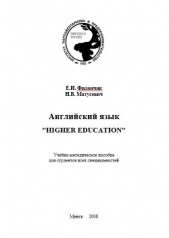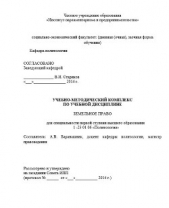Английский язык. Higher education

Английский язык. Higher education читать книгу онлайн
Настоящее учебно-методическое пособие предназначено для студентов социально-экономического факультета ИПП как дневной, так и заочной формы обучения, изучающих социокультурный и/или лингвострановедческий курс английского языка. Рассчитано на 72 часа аудиторной работы для студентов гуманитарных и экономических специальностей на дневной форме обучения, 30 часов и 10 часов соответственно для студентов гуманитарных и экономических специальностей на заочной форме обучения, что отображено в разделе 1 пособия.
Характер данного пособия определяется целью, которая ставится при обучении иностранным языкам в неязыковых вузах - углубление иноязычных знаний и формирование коммуникативных навыков и умений студента. Данное пособие призвано обеспечить студентов тематически упорядоченным языковым материалом, который может служить основой для развития и закрепления навыков, необходимых для глубокого понимания содержания иноязычного текста, анализа прочитанного, подготовки к монологической и диалогической речи, а также для письменных сообщений.
Внимание! Книга может содержать контент только для совершеннолетних. Для несовершеннолетних чтение данного контента СТРОГО ЗАПРЕЩЕНО! Если в книге присутствует наличие пропаганды ЛГБТ и другого, запрещенного контента - просьба написать на почту [email protected] для удаления материала
The Academic Year starts in October.
It is not necessary for pupils going on to higher education to take any qualifications at all.
ACTIVITY B
READING
DIRECTIONS:
Now read.
Higher Education in Great Britain
The UK post-school institutions of higher education are universities, polytechnics and other higher education colleges.
In general, there are forty-seven universities in Britain and thirty former polytechnics (now also universities), plus 350 colleges and institutes of higher education (some of which train teachers).
They are divided into three types: the old universities (Oxford, Cambridge and Edinburgh Universities), the 19th century universities such as London and Manchester universities, and the new universities.
Pupils going on to higher education or professional training usually take «A» level examinations in two or three subjects. Universities accept students mainly on the basis of their «A» level results, although they may interview them as well.
In 1971 the Open University was started. It is a unique institution, which, as its name suggests, is open to all. It is not necessary for students of the Open University to have any previous qualifications. Nearly a quarter of all adult part-time students follow its degree courses through the medium of television and radio. The first graduates received their degrees in 1973.
Besides the Universities there are other institutions such as Polytechnics and Technical Colleges. These tend to offer courses of vocational nature as well as academic courses. Colleges of Education provide training and education for prospective teachers.
Undergraduate courses normally take three years of full-time study, although a number of subjects take longer, including medicine, architecture and foreign languages (where courses include a year abroad). They lead in most cases to a Bachelor's degree in Arts or Science. There are various postgraduate degrees, including Master and Doctor of Philosophy. The last two are awarded for research in arts or sciences. It may take any number of years to finish the original research work necessary to get these degrees.
Degrees are awarded either by the institution itself, or by the Council for National Academic Awards, particularly in vocational areas. Students of law, architecture and some other professions can take qualifications awarded by their own professional bodies instead of degrees.
At present, students who have been accepted by universities or other institutions of higher education receive a grant from their local authority, which covers the cost of the course, and may cover living expenses.
Parents with higher incomes are expected to make a contribution. Until 1990 the grant did not have to be paid back, but now a system of loans has been introduced.
The Academic Year has three terms; it starts in October, each term lasting eight weeks at Oxford and Cambridge, or ten weeks at other universities. Students have vocations at Christmas, at Easter, and the so called «Long Vac» in summer.
British universities greatly differ from each other. They differ in date of foundation, size, history, traditions and general organization. The most famous universities are Oxford and Cambridge, called «Oxbridge». They are famous for their academic excellence.
ACTIVITY C
VOCABULARY STUDY
PART I
DIRECTIONS:
Match the synonymous pairs.
to go on
a qualification
a scholarship
to interview
a postgraduate degree
to cover the cost
training
a student of correspondence courses
to inquire
a part-time student
an academic title
preparation
a grant
to continue
to defray the expenses
an examination
PART II
DIRECTIONS:
Match the words from the list with their definitions:
vocational, graduate, grant, academic, fee, term, tuition, undergraduate, keep, course, degree
1. - concerning education, esp. in a college or university (adj.)
2. - necessary goods and services, esp. food and lodgings
3. - a title given by a university to a student who has completed a course of study
4. - a set of lessons or studies
5. - a sum of money paid for professional services
6. - instruction or teaching
7. - a person who has completed a university degree course for a first degree
8. - preparing one for a job (adj.)
9. - a student who is doing a university course for a first degree
10. - any of the three periods of time into which the teaching year is divided at schools, universities.
11. - money given esp. by the state for a particular, purpose, such as to a student during a period of study.
PART III
DIRECTIONS:
Translate the sentences into Russian. Be ready to give their back translation.
She graduated from Oxford with a first-class degree in physics.
She’s a full-time student at the University.
I obtained my diploma by correspondence, but it’s none the less valuable for that.
Did you pass your history exam?
When will you know the exam results?
She failed her exams and will have to take them again.
In order to become a student one must pass a university entrance examination.
When do you take your finals?
You’ll be examined in French and German.
ACTIVITY D
READING COMPREHENSION
PART 1
DIRECTIONS:
Agree or disagree with the following statements:
1. It is not necessary for students of the Open University to have any previous qualifications.
2. Universities accept students mainly on the basis of their «A» level results.
3. Polytechnics and vocationally oriented schools give higher education.
4. British students do not get grants.
5. It usually takes 5 years to get a Bachelor of Arts or Bachelor of Science degree.
PART II
DIRECTIONS:
Answer the questions:
1. What is necessary to go on to higher education?
2. What types of higher educational establishments are there in the UK?
3. What courses of study are offered by higher education establishments?
4. What is the procedure of awarding degrees?
5. What are the conditions of receiving grants?
6. What are the Oxbridge universities famous for?
PART III
DIRECTIONS:
Translate into English:
1. В университеты принимают студентов в соответствии с результатами сдачи ими экзаменов продвинутого уровня.
2. В открытом университете не нужны формальные результаты.
3. В открытом университете учатся взрослые студенты-вечерники и заочники.
4. Вузы Великобритании подразделяются на следующие типы: университеты (в том числе бывшие политехнические институты), колледжи и институты.
5. Обучение на дневном отделении обычно длится три года и более.
6. Обучение студентов обычно приводит к получению степени бакалавра гуманитарных или естественных наук.
7. Степень магистра присуждается за исследования в области гуманитарных или естественных наук.
8. Экзамены на присуждение степеней сдаются в вузе, Национальном совете по присуждению ученых степеней или в профессиональных органах.
9. Студенты получают стипендии от местных органов власти, которые обязательно покрывают стоимость обучения и иногда - стоимость проживания.























